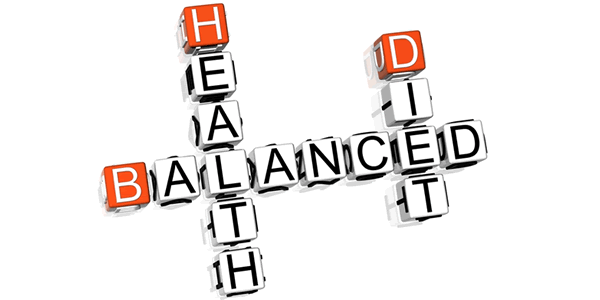
Poor nutrition can occur for many reasons from a lack of availability of healthy food, to limited knowledge of nutritional requirements and what foods are healthy or a simple tendency to eat the wrong types of food due to personal preferences.
Whilst a few bad choices won’t make much of difference if you eat a nutritious balanced diet the majority of the time, if a nutritionally inadequate diet is followed on a daily basis, there can be serious repercussions for our health.
What is ‘good nutrition’?
Good nutrition does not mean that you need to take supplements and eat only organic super foods. A healthy balanced diet can be achieved easily by eating a wide variety of foods, where possible fresh, that have undergone as little processing as possible.
Variety is very important to get all the nutrients that the body needs to perform its daily functions correctly as different foods contains different vitamins and minerals. The correct amount of food to fuel you body but not lead to undesirable weight gain is also important, as is a diet that limits foods containing substances or nutrients known to be unhealthy, such as saturated fats and high levels of salt.
Poor nutrition can have serious health consequences for all types of people; however symptoms may not always be obvious. Those particularly at risk are the elderly, those with medical conditions that affect the appetite and even those following a strict diet that eliminates key food groups.
It should be noted however, that a person can be overweight and still be considered malnourished if they are eating an unhealthy diet, as though they are meeting their requirements for calories, they may not be getting all the nutrients they need.
Signs of poor nutrition
1. Weight Changes
Changes in weight, be in gain or loss, are not always a symptom of poor nutrition. It is perfectly possible to gain or lose weight whilst eating a healthy balanced and nutritious diet. However, often a rapid weight change may indicate changing eating patterns and be an early sign of poor nutrition.
Weight loss, particularly to levels that are considered unhealthy, may occur due to decreased intake, which leaves the risk of not enough food being consumed to meet requirements. On the other hand, weight gain may be due to excessive intake of high calorie, low nutrient foods which do not provide the necessary nutrition.
2. Disease and illness
As many nutrients found in food are essential for the processes that take place in the body, if these are not consumed things can start to go wrong. Lack of certain nutrients can lead to debilitating conditions which in the long term can have serious consequences.
Lack of calcium for example, especially during years of bone growth, can lead to osteoporosis late in life, while a lack of iron can lead to anaemia. Not enough vitamin B12 can lead to nervous system problems over time and lack of vitamin A results in blindness, although this is mainly seen in populations with very low intake due to lack of food supply such as in third world countries.
It is common that people with poor nutritional intake are often more susceptible to viruses and infections as their body lacks the energy and nutrients needed to feed the immune system and fight disease. These people may seem to constantly have a cold or the flu and rarely appear to be completely healthy.
If you suspect you have a condition caused by lack of a certain nutrient or by a poor diet in general, see your health professional to determine if this is the case. Symptoms associated with malnutrition are often similar to those of many other conditions, so it is essential to get a correct diagnosis to determine the right treatment.
3. Tiredness and lack of concentration
Although these may not seem as serious as a full blown disease or condition, feeling lethargic, tired and unable to concentrate can make everyday activities a lot more difficult and can impact your life in a big way from how you perform at work to having enough energy to do exercise.
Tiredness can be related to a huge number of nutrient deficiencies, although the most common are things like iron, particularly in women and athletes, B12 and water. Skipping meals can also lead to lethargy as the body is not receiving the energy it requires to function.
4. Physical symptoms
Sometimes it is possible to see physical effects of a poor diet. These could be things like flaky, dry skin, lifeless, thin hair, cracked nails, diarrhoea or constipation, poor oral health and poor would healing. In severe cases, infertility, and lack of menstruation in women may result.
5. Conditions with high risk of poor nutrition
There are many conditions that may impact negatively on nutrition status and lead to inadequate intake. For example those undergoing cancer treatments often experience changes in appetite which can lead to a drop in intake and poor nutrient intake at a time when they need it most.
Elderly people, especially those that are ill or have an impairment of some nature are also susceptible as many will rely on others for food or even forget to eat as well as a reduced appetite being common in old age.
Those with eating disorders who are severely reducing intake are at a very high risk, as are alcoholics who may neglect food in favour of drinks which provide little or no nutrients.
